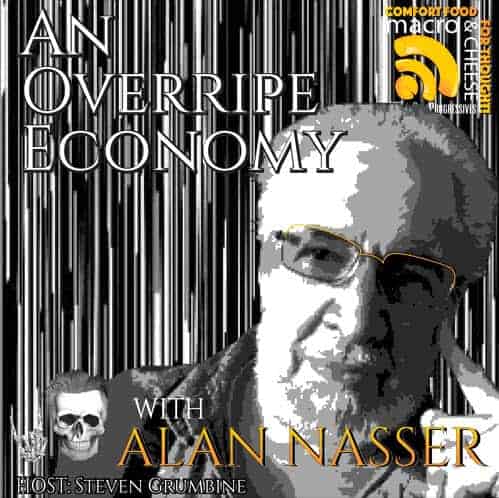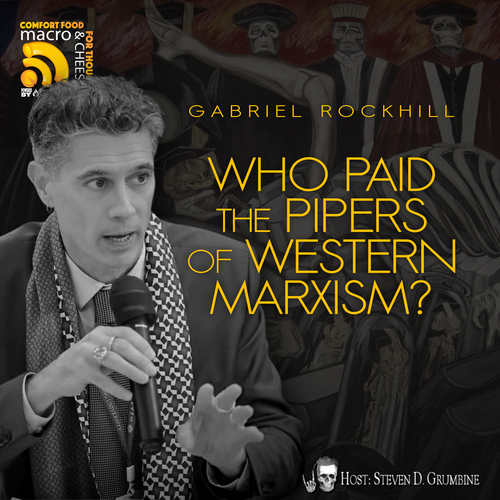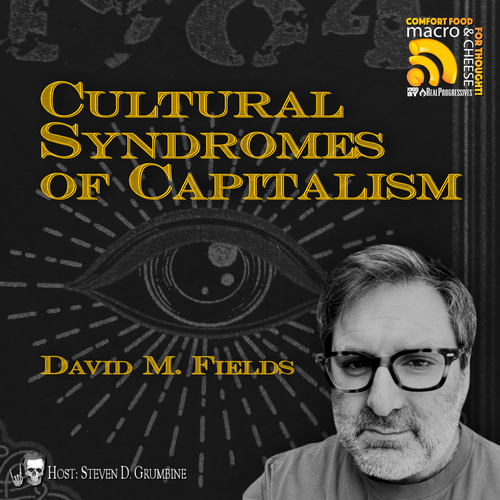Episode 11 – An Overripe Economy with Alan Nasser

FOLLOW THE SHOW
Steve’s guest Alan Nasser talks about his book Overripe Economy: American Capitalism and the Crisis of Democracy. He predicts a new economic crisis brought about by the disappearance of productive capital and the rise of the financialized economy.
Alan Nasser joins Steve to discuss his new book Overripe Economy: American Capitalism and the Crisis of Democracy. Alan is Professor Emeritus of Political Economy & Philosophy at The Evergreen State College. His prediction of a new economic crisis is substantiated by a thorough exploration of the history of capital development as it passed from its most productive stage, the “Golden Age” from 1949 to 1973, into this new financialized economy, where massive profits are no longer invested in growth, but are used for stock buybacks and price manipulation. He speaks of “disaccumulation” and maintains that capital’s only job is to increase itself. Nasser insists we must look to the government for investments that support the public purpose.
AlanNasser.org
Macro N Cheese – Episode 11
An Overripe Economy with Alan Nasser
April 13, 2019
Alan Nasser [intro/music] (00:03):
We are in a period now of slow growth, low wage posterity capitalism.
Alan Nasser [intro/music] (00:14):
Republican and Democratic elites alike have rejected the legacy of the New Deal and the Great Society.
Alan Nasser [intro/music] (00:24):
There’s nothing in the private sector that can absorb all that money. And hence, it’s going for financial purposes that are completely unproductive.
Geoff Ginter [intro/music] (00:41):
Now let’s see if we can avoid the apocalypse altogether. Here’s another episode of Macro N Cheese with your host, Steve Grumbine.
Steve Grumbine (01:34):
All right. It is Steve with Real Progressives. I am very, very pleased to bring Alan Nasser who is just a wonderful, wonderful man, decorated beyond words, just absolutely phenomenal. He wrote a book that was brought to my attention by one of our friends here at the program named Randy Mandell, and Randy said, “You have got to interview my friend Allen Nasser.
He wrote this great book “Overripe Economy and, uh, Alan is MMT friendly. So, but this book right here, you’ve got to, got to see it to believe it.” And I said, all right, I look forward to hearing about it. So in any event, what I want to do is I want to show you a little bit of Alan’s background here. Alan is quite the storied guy.
Allen is a Professor Emeritus of Political Economy and Philosophy at the Evergreen State College where he taught from 75 to 2006. He received his doctorate from Department of Philosophy at Indiana University. He’s taught at Indiana University, Binghamton University and Grinnell College. He had visiting appointments at the University of Oregon, University of Washington and Hampshire College.
He’s also delivered invited presentations at Dartmouth College, University of London, Oxford University, University of Lille, the University of Peking and York University. His articles have appeared in a range of venues, including the Australasian Journal of Philosophy, the International Philosophical Quarterly, Philosophy and Phenomenological Research.
I am just doing justice . . . Anyway, bottom line is some of the places that I have seen in particular Counterpunch, Common Dreams and so on. So one of the big things here is obviously Alan’s book, “The Overripe Economy, this is going to bring me to my guest and I’m going to bring him on right now without further ado, Alan Nasser. Thank you so much for joining us, sir.
Nasser (03:46):
Thank you too, Steve, for the invitation.
Grumbine (03:49):
Absolutely, absolutely. So, you know, we talked a little bit before this, uh, earlier today kind of get a feel for things. You were kind enough to send me a copy of your book. And one of the things that jumped out at me, obviously we spend an inordinate amount of time talking about Modern Monetary Theory, but this book here is about something a little bit more, uh, more, you know, it’s long term, there’s a big picture here.
And, and what I wanted you to do is kind of lay out what the point of “The Overripe Economy” is and kind of help us understand what you were thinking about and what the book’s all about.
Nasser (04:28):
Sure, sure. Uh, I want the book to help people to understand the transition from productive capitalism to finance capitalism, the different forms the financialization has taken. And I do this by tracing the history of the economy from the years of industrialization, which were in the 19th century through the 1920s and the 1930s and the so-called golden age, which was, you know, roughly 1949 to 1973.
And then the period of austerity, which is, uh, 1975 and after where real wages begin to decline, and the gap between productivity gains and wage gains gets increasingly enormous. And the economy is increasingly prone to various kinds of crises, uh, particularly our credit crisis in the financial sector. So yeah, I, I do an historical discussion of the evolution of capitalism, of American capitalism.
So people can understand that the system exists always in motion and moving from one stage to another. And I use the concept of maturity, which was very common in the twenties, thirties and forties. The US economy is mature. It gets industrial infrastructure is as developed, it is as highly developed, it’s in fact over-developed.
I suggest that, and I cite the, uh, the Nobel Prize winning geneticist, Sir Peter Medawar, who talked about, uh, the kinds of entities, like individual people, populations of people and cities, which grow by nature. It’s their nature to grow, but their growth is limited and their growth is limited by the very same factors that propel the growth in the first place.
And I thought that was quite an interesting observation and insight of his. And I, of course, it occurred to me that this is precisely describes, uh, modern capitalism. It is prone to crisis, and it has endured the two major crises, uh, beginning of 1929 and then 2008. So yeah, and trying to help people understand the crisis of 2008, the housing crisis, and to help them to understand the current features of the US economy.
Like, as I said, declining living standards and declining wages, and the much talked about decline of, of the middle class. And I’m suggesting that the United States is moving toward becoming a really poor country. There’s an awful lot of stuff out there on the decline of the middle class. A lot of which has to do with automation and robotization, but the middle class is not just declined.
It’s the middle-class people who’ve been driven out of the middle class have been driven into a lower class. And I think we are in a period now of slow growth, low wage, austerity capitalism. And I think the key idea here is if most people understand, uh, that we live it from 49 to 73 under the legacy of the New Deal and the Great Society.
And the thing is, uh, as I show, I try to show at length in my book that elites, Republican and Democratic elites alike have rejected the legacy of the New Deal and the Great Society. They’ve rejected the idea of the social wage and, uh, the, the old-fashioned idea that people need to depend entirely on the market to stay alive and to find work is being resurrected.
And we’re kind of back to 19th century capitalism in that sense. Anyway, that’s, that’s an awful lot and, uh, I’ll, I’ll stop there.
Grumbine (08:38):
No. It’s an incredible man. That’s why we brought you on because you are an absolute wealth of knowledge. You brought up a word earlier today in our conversation that I would like to touch on. Um, it’s a word that I’m not familiar with and I’m want to become familiar with.
And that’s disaccumulation you had said this was a very important aspect of this book and you explored it. Can you talk to us and explain what disaccumulation means and what, what that means to us in particular?
Nasser (09:09):
Yes. Uh, well, disaccumulation, the concept and the phenomenon is parasitic on the notion of accumulation and in the language of economics and political economy, accumulation means the expansion of capital, the accumulation of capital – capital being the principle form of wealth in any capitalist society, as you would, of course expect and industrialization begins.
And without it, it begins the period of accumulation and without it accumulation would not be possible. So the accumulation of capital means the expansion of capitalist wealth; and, you know, the whole capitalist process capitalism produces outputs, presumably. It produces, you know, stuff, product. That’s called output. And the whole process requires inputs.
And here are, I’ll use just standard old-fashioned capitalism that employs wage workers to produce material objects, you know, including services, but there’s labor and there’s capital. And those are the two inputs to production and to capital accumulation; and the accumulation of capital proceeds by making both capital and labor, uh, increasingly unnecessary to the expansion of capitalist wealth.
And disaccumulation means that these two inputs, capital, and labor, become cheaper and cheaper; and that’s associated with many severe problems, slow growth, increasing austerity, the assault on the New Deal and the Great Society legacy. You know, one of the things that’s discussed very much by mainstream economists, not as much by, by radical economists, but some by radical economists.
And it needs a much more discussion in radical circles, but the cost of technology, of the technological inputs to production has been falling rather rapidly. And, uh, Lawrence Summers has talked about this and all sorts of people have discussed the cheapening of the, the inputs to production, both capital and labor.
And, you know, you might expect that because capitalism is about profits and profits are revenues minus costs. And because of so many more countries are getting into the capitalist game and because of certain features of globalization and also because consumers just have less and less spending power than they did during the golden age.
Grumbine (11:57):
Let me say what I was hearing you say, which has got me getting ready to ask you the follow up question. You’re pointing to this race to the bottom, if you will, based on technology, as technology becomes cheaper by definition, cheapens labor.
And this kind of comes to a point you and I had spoken about earlier today, which was the replacement of the private state and switching it over, flipping the script, so to speak to the public state. I’m calling it that. I know those aren’t the exact terms you use, but public investment, public asset, public capital, as opposed to focus on the private sector, which is basically run its course.
In order for us to survive we really do need to focus on the public side of that ledger. And this is kind of where we get into some of my favorite subjects, but I’m interested in hearing you take this to that next, the next point in terms of how do we address this publicly?
It’s one thing to cry for a bloody revolution and, you know, like Marx, you know, some folks would say, you know, Marx has called for bloody revolution and so forth; but we’re here in this position where there is alternatives. And it sounds like there’s an alternative by approaching it from reclaiming the state as Bill Mitchell would say. Talk to me about this concept of recapitalizing society through public space.
Nasser (13:31):
Yeah. Yeah. That’s one of the principle points of the book. And I might add that Marx for the United States especially, called for bloody revolution. He thought that the United States and the Netherlands were the two places where you would have a transition to socialism democratically, you know, peacefully.
One of the main problems with capitalism right now is that the cheapening of technology, I mean, artificial intelligence has made the technological inputs to capitalist production much cheaper than it used to be.
And the neoliberalism, you know, the rejection of the legacy of the New Deal and the Great Society, the movements of the whole political spectrum to the right means that the costs of production, labor and technology are declining, which means, you know, if profits is revenues minus costs, profits are growing quite spectacularly in the private sector, but profitable investment outlets are not.
And capitalism has required over its history, a certain kind of massive technological innovations that transform society entirely and stimulate a whole range of industries. And the classic example, of course, is the automobile, the “automobileisation” of America, the introduction of the automobile.
It stimulates a road construction, uh, a highway construction, uh, it uh, travel people taking vacations, uh, it stimulates the oil industry and production of rubber and grass. And it also makes suburbanization possible. And suburbanization, I would see as an innovation as radical as the steam engine and the railroad and the, uh, the automobile.
Suburbanization stimulates every single sector of the economy. You know, things like the railroad, which stimulated production by, uh, de-localizing production and creating the possibility for a mass market. You know, that kind of innovation is the sort of innovation, the steam engine, the railroad, and the automobile, the major point that Baran and Sweezy make in “Monopoly Capital,” those kinds of innovations are required for longterm capitalist growth.
And that period of semi-prosperity that we saw from 49 to 73, was the longest period of capitalist growth without a serious recession in the history of the economy. That kind of innovation is necessary. And the prospects for it are grim. Corporations are awash in more profits than you can imagine. They’re stashing a lot of it overseas.
They’re now using much of it to buy back their own stocks, driving up the share prices. And since capitalist executives are paid in part by shares that they hold, the tremendous profits require as a . . . to absorb them: innovations like the ones I was talking about – the railroad, the steam engine, the automobile, suburbanization.
These are the things that made the golden age possible – suburbanization, “automobilization.” And I might add a very importantly, the expansion of credit because without consumers taking on more credit than they could manage, we wouldn’t have seen that golden age growth period.
So what I’m suggesting is the prospect: I mean, when you look at the whole picture of the US economy, how it’s been going, what future possibilities there are, we come to the conclusion that outlets for absorbing investment outlet’s, for absorbing the enormous profits that capitalists firms are making; those prospects for that kind of surplus absorber, if I could put it that way, are relatively grim.
And, uh, I think one of the tasks of Progressives is to help people to understand that these huge revenues and the tremendous wealth that capitalism is able to provide now and is providing cannot be put to profitable use in the private sector. Those outlets have been exhausted, and I . . . that’s a rather large claim, but I, I try to back it up with a great deal of historical and economic detail in my book.
Intermission (18:23):
You are listening to Macro N Cheese, a podcast brought to you by Real Progressives, a nonprofit organization dedicated to teaching the masses about MMT or Modern Monetary Theory. Please help our efforts and become a monthly donor at PayPal or Patreon, like and follow our pages on Facebook and YouTube and follow us on Periscope, Twitter and Instagram.
Grumbine (19:18):
My goodness. I just, I just had a chill go over me as I considered what you’re saying. It is really quite amazing to me how innovation in some ways has completely, and we don’t see the disruptive technology. We don’t see the kinds of, um, evolution that brings about robust buying cycles for the overall population like we once did.
And what you’ve got is a situation where there’s all this massive wealth accumulated at the top and nowhere to do anything with it. It, it literally has that . . . Oh, my goodness. I just, I’m sorry. That was just a very big wake up call.
Nasser (19:59):
Yeah. And when you say nowhere to do something with it, what you mean, or what I take you to mean is no sufficiently massive private investment opportunities exist to absorb those profits, to absorb that surplus and put it to work. So what’s happening instead is that those profits are used for speculation for various financial purposes.
I detail in my book, what percentage of the, of the total revenues, not just the profits, total revenues of some of the largest companies like Microsoft are going into buying back the company stock in order to drive up, share prices in order that the shareholders who are mainly, uh, managers and executives can get, can get richer. There’s nothing in the private sector that can absorb all that money.
And hence it’s growing, it’s being used for financial purposes that are completely unproductive. Where that money needs to go is to the public sector. And I think most people understand that our schools need more funding, that our highways and infrastructure need to be massively reconstructed, and meeting the ecological challenge is something that only the public sector can do.
So capitalist wealth now, if we’re not to have chronic growth stagnation and the decline of the median wage forever, we need to see massive investments in the public sector – in mass transit, in education. I think almost everyone is aware of the problems; so that US infrastructure, well, we have the money to deal with those things, but it is capitalism and capital is not supposed to be . . . its job is not to address those issues.
Its job is just to expand itself. And the way it is expanding itself is, uh, is making jobs disappear. And what’s expanding is finance capital, really. The customers of hedge funds are doing better than ever, but that means that everybody else is not doing very well.
And I, I discuss in my book the various consequences and ways in which the decline of the median wage, for example, and the disappearance of the middle class has, has cost working people a great deal in terms of public services and wages.
Uh, yeah, it’s just, it’s a rather long story and why it took me eight years to write that book because I, you know, my, my claim is a very radical claim and it might sound somewhat extreme to many people. But if you, if you look at the book, you will find that the claims that I’ve been making are, are supported with a massive amount of historical and empirical evidence.
Grumbine (23:04):
Yes, I, you know, so we, we look at this push for a Green New Deal today, and we think, uh, you know, we’ve been fighting for, you know, a lot of various public space, reinventing the public purpose, if you will, reviving the public purpose. And there is so much left undone, so much left in absolute shambles in, in society that we could have a huge, you know, resurrection were we to focus on the public space.
And we’ve allowed ourselves to go into rot because of this overripe economy, as you say, this, this capitalism that has really exceeded its purpose in the sense. I really, really, really value what you just laid out there.
Let me ask you, and I just want to kind of get a feel for, what would you say is the most important thing that you would like someone to take away from this book, if they were picking this book up and, you know, reading it for the first time, what, what would you say is the most important point that you would like them to take from it?
Nasser (24:11):
Yeah, I think the most important point would be that the best way first is to be aware of the assault on labor that contemporary capitalism is about; you know, the, the shrinking of the middle class, the expansion of the low wage workforce, stealing away of benefits, which is part of rejecting the New Deal and the Great Society.
All those things are happening now, tripled in spades. And I would like people to understand why we have reached this point of declining living standards capitalism; and I hope that people can be led to understand that by following the historical narrative that I do in my book. I discuss at some length, the historical development of capitalism.
And I’d like people to understand how that development created certain institutions and certain tendencies in the system, which make it inevitable that growth will slow down and living standards will decline. One thing that I emphasize is the employment of credit in order to create the golden age, for example, and to create the high American standard of living.
This started in the twenties, you know, you know, the roaring twenties, when the first time that consumer durable goods became available to everyone – refrigerators, ranges, fans, toasters, radios. People were buying these things had never been available before; they were buying these things like crazy. People were living high in the twenties.
However, when you look at the data, you find that 71% of the population was living below the poverty line. How is that possible when they’re spending all this money on the new consumer durable goods — and well, credit. During the 1920s, people took on far more credit than they could sustain. Their purchases went down when they stopped borrowing at the rate at which they had been borrowing.
Purchases went down. Production slowed down. The economy slowed down, and we were right into the Great Depression, I think, where we were one step ahead of the Great Depression. And credit has always been the substitute for a living wage, a decent wage, a wage that commensurate with the contribution of labor to capitalist activity.
Wages have not been commensurate with labor’s contribution; and in the 1920s and during the golden age, Americans took on an unsustainable credit load. And, uh, I discussed in my book how at the end of the 1920s, the taking on of credit slowed down quite dramatically because people were in debt over their heads. And this is a lot of what the Great Depression had to do with.
And we saw the same thing happen leading up to the crash of 2008. You know, it was about mortgages, it’s about mortgage debt, but right now there’s tremendous consumer debt, consumer debt is growing again. It slowed down after 2008, but it’s picking up again. And both the twenties and the golden age were dependent on very high levels, unsustainable crisis generating levels of credit.
And we also find now that the corporate sector corporations are spending more than their total revenues on buying back their own stocks. Where are they getting the money from? Well from equity partially, but mainly it’s leveraged. They’re borrowing the money to buy back their shares.
So I’m suspecting that we’re going to see a credit bubble in the financial sector. We’re going to see a credit bubble. We’re going into debt to buy back massive shares of one’s own company. This I think is a very, very serious issue. And I think the next credit crisis, the next bubble bust is very likely to include the credit that was taken on not by households, but by companies to buy back enormous amounts of shares.
Grumbine (28:38):
So stock buybacks are definitely poison, but add in, if you will, the student debt crisis. We’re at $1.5 trillion dollars. Many of these people have never had their first job before. I mean, this is unsustainable, no matter how you slice it; add in the corporate, we’re headed for an even bigger bubble burst, if you will, than we saw in 2008 and nine. I mean, it’s amazing.
Nasser (29:04):
Yeah, I think you’re quite right. I think the next bubble is, and there are very many, uh, quite reputable mainstream economists whose economics just stinks to high heaven, but they’re, very many of them are predicting a rerun of 2008 only on a much larger scale. And I think this is true. I mean, there’s an auto loan bubble where most of the people in debt are low-income people.
There’s student debt, much of which is simply unpayable, you know, it needs to be entirely forgiven, which is economically possible, but it’s goes against neoliberal orthodoxy, you know. So there is student debt, there’s auto loan debt.
There’s just debt in general; there’s corporate debt to finance buybacks. I think there is a multifaceted credit bubble growing that it’s not conceivable that that bubble doesn’t pop. And when it does, it will look, I believe quite uglier than 2008, 2009.
Grumbine (30:08):
You know, I have personal experience with the last crisis and I’m still in it, if you will. And so the idea, you know, I liken this to, when you see a tsunami. You’re standing on the beach, the water recedes, you go out there and pick up some shells that you would have never seen before cause the water’s gone back so far; and before you know it, a wall of water is coming at you so hard and strong that it takes out everything in its path.
And that right there is what I’m deathly afraid of, you know, as a father and a economic activist, a Progressive, a human being, you know, that we have not learned anything from the last crisis. We’ve put no stop gaps in there whatsoever for mankind. We as people are not currency issuers. So we have no shock absorbers of our own. You look at this and you say, how is mankind to survive?
And then the worst of the worst, the people that fit that next rung up that have enough to survive, whatever hits will largely not even hear the sounds of the cries under the pillow. And they’ll be like, huh, what? And it’ll just pass. And all of a sudden, all the people that were vulnerable will be swept out to sea. And that’s what I’m so terrified of. And, and this, this is a call to arms, Alan.
I really appreciate your book very, very much. And I appreciate your insights very, very much. And I appreciate your time. This, this meant a lot to me. I want you to know that. I, I feel, you know, I get to interview a lot of people and, uh, this is, this is a very special interview for me. So I, I really appreciate this Alan.
Nasser (31:57):
Well, thank you. Yeah, it’s my pleasure to, uh, to talk with you, Steve. Thank you so much.
Grumbine (32:05):
Absolutely. Folks, thank you all so much for joining us. This is Alan Nasser. Please pick up a copy of his book “Overripe Economy.” I think you can’t go wrong with this. Alan, thank you once again. And I look forward to talking to you again real soon. Have a great one, everybody.
Nasser (32:22):
Okay. You too, Steve.
Ending Credits (32:29):
Macro N Cheese is produced by Andy Kennedy, descriptive writing by Virginia Cotts and promotional artwork by Mindy Donham. Macro N Cheese is publicly funded by our Real Progressive Patreon account. If you would like to donate tobacco and cheese, please visit patreon.com/realprogressives.
Related Podcast Episodes
Related Articles








